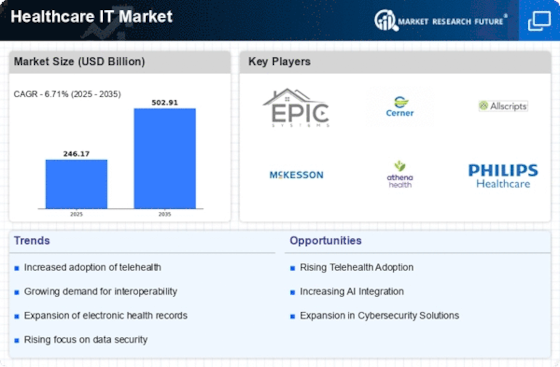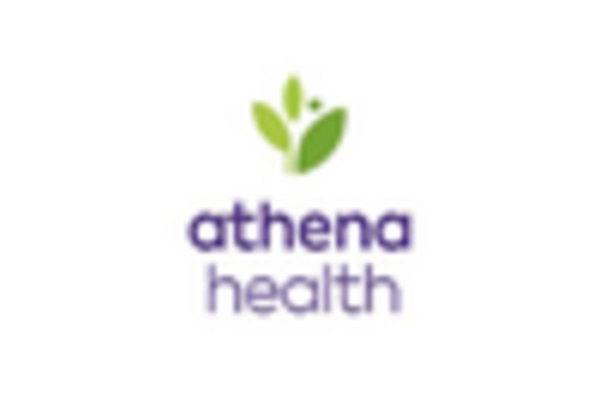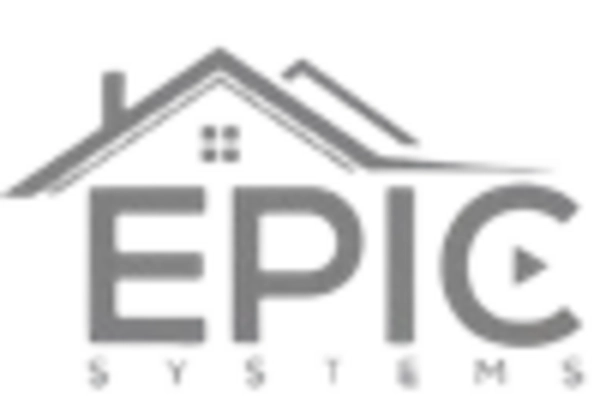Electronic Health Records
Telemedicine
Healthcare Analytics
Patient Engagement Solutions
Healthcare Information Exchange
Hospitals
Ambulatory Surgical Centers
Clinics
Pharmaceutical Companies
Research Organizations
On-Premise
Cloud-Based
Hybrid
Administrative Solutions
Clinical Solutions
Financial Solutions
North America
Europe
South America
Asia Pacific
Middle East and Africa
North America Outlook (USD Billion, 2019-2035)
Healthcare IT Market by Application Type
Electronic Health Records
Telemedicine
Healthcare Analytics
Patient Engagement Solutions
Healthcare Information Exchange
Healthcare IT Market by End User Type
Hospitals
Ambulatory Surgical Centers
Clinics
Pharmaceutical Companies
Research Organizations
Healthcare IT Market by Deployment Mode Type
On-Premise
Cloud-Based
Hybrid
Healthcare IT Market by Functionality Type
Administrative Solutions
Clinical Solutions
Financial Solutions
Healthcare IT Market by Regional Type
US
Canada
US Outlook (USD Billion, 2019-2035)
Healthcare IT Market by Application Type
Electronic Health Records
Telemedicine
Healthcare Analytics
Patient Engagement Solutions
Healthcare Information Exchange
Healthcare IT Market by End User Type
Hospitals
Ambulatory Surgical Centers
Clinics
Pharmaceutical Companies
Research Organizations
Healthcare IT Market by Deployment Mode Type
On-Premise
Cloud-Based
Hybrid
Healthcare IT Market by Functionality Type
Administrative Solutions
Clinical Solutions
Financial Solutions
CANADA Outlook (USD Billion, 2019-2035)
Healthcare IT Market by Application Type
Electronic Health Records
Telemedicine
Healthcare Analytics
Patient Engagement Solutions
Healthcare Information Exchange
Healthcare IT Market by End User Type
Hospitals
Ambulatory Surgical Centers
Clinics
Pharmaceutical Companies
Research Organizations
Healthcare IT Market by Deployment Mode Type
On-Premise
Cloud-Based
Hybrid
Healthcare IT Market by Functionality Type
Administrative Solutions
Clinical Solutions
Financial Solutions
Europe Outlook (USD Billion, 2019-2035)
Healthcare IT Market by Application Type
Electronic Health Records
Telemedicine
Healthcare Analytics
Patient Engagement Solutions
Healthcare Information Exchange
Healthcare IT Market by End User Type
Hospitals
Ambulatory Surgical Centers
Clinics
Pharmaceutical Companies
Research Organizations
Healthcare IT Market by Deployment Mode Type
On-Premise
Cloud-Based
Hybrid
Healthcare IT Market by Functionality Type
Administrative Solutions
Clinical Solutions
Financial Solutions
Healthcare IT Market by Regional Type
Germany
UK
France
Russia
Italy
Spain
Rest of Europe
GERMANY Outlook (USD Billion, 2019-2035)
Healthcare IT Market by Application Type
Electronic Health Records
Telemedicine
Healthcare Analytics
Patient Engagement Solutions
Healthcare Information Exchange
Healthcare IT Market by End User Type
Hospitals
Ambulatory Surgical Centers
Clinics
Pharmaceutical Companies
Research Organizations
Healthcare IT Market by Deployment Mode Type
On-Premise
Cloud-Based
Hybrid
Healthcare IT Market by Functionality Type
Administrative Solutions
Clinical Solutions
Financial Solutions
UK Outlook (USD Billion, 2019-2035)
Healthcare IT Market by Application Type
Electronic Health Records
Telemedicine
Healthcare Analytics
Patient Engagement Solutions
Healthcare Information Exchange
Healthcare IT Market by End User Type
Hospitals
Ambulatory Surgical Centers
Clinics
Pharmaceutical Companies
Research Organizations
Healthcare IT Market by Deployment Mode Type
On-Premise
Cloud-Based
Hybrid
Healthcare IT Market by Functionality Type
Administrative Solutions
Clinical Solutions
Financial Solutions
FRANCE Outlook (USD Billion, 2019-2035)
Healthcare IT Market by Application Type
Electronic Health Records
Telemedicine
Healthcare Analytics
Patient Engagement Solutions
Healthcare Information Exchange
Healthcare IT Market by End User Type
Hospitals
Ambulatory Surgical Centers
Clinics
Pharmaceutical Companies
Research Organizations
Healthcare IT Market by Deployment Mode Type
On-Premise
Cloud-Based
Hybrid
Healthcare IT Market by Functionality Type
Administrative Solutions
Clinical Solutions
Financial Solutions
RUSSIA Outlook (USD Billion, 2019-2035)
Healthcare IT Market by Application Type
Electronic Health Records
Telemedicine
Healthcare Analytics
Patient Engagement Solutions
Healthcare Information Exchange
Healthcare IT Market by End User Type
Hospitals
Ambulatory Surgical Centers
Clinics
Pharmaceutical Companies
Research Organizations
Healthcare IT Market by Deployment Mode Type
On-Premise
Cloud-Based
Hybrid
Healthcare IT Market by Functionality Type
Administrative Solutions
Clinical Solutions
Financial Solutions
ITALY Outlook (USD Billion, 2019-2035)
Healthcare IT Market by Application Type
Electronic Health Records
Telemedicine
Healthcare Analytics
Patient Engagement Solutions
Healthcare Information Exchange
Healthcare IT Market by End User Type
Hospitals
Ambulatory Surgical Centers
Clinics
Pharmaceutical Companies
Research Organizations
Healthcare IT Market by Deployment Mode Type
On-Premise
Cloud-Based
Hybrid
Healthcare IT Market by Functionality Type
Administrative Solutions
Clinical Solutions
Financial Solutions
SPAIN Outlook (USD Billion, 2019-2035)
Healthcare IT Market by Application Type
Electronic Health Records
Telemedicine
Healthcare Analytics
Patient Engagement Solutions
Healthcare Information Exchange
Healthcare IT Market by End User Type
Hospitals
Ambulatory Surgical Centers
Clinics
Pharmaceutical Companies
Research Organizations
Healthcare IT Market by Deployment Mode Type
On-Premise
Cloud-Based
Hybrid
Healthcare IT Market by Functionality Type
Administrative Solutions
Clinical Solutions
Financial Solutions
REST OF EUROPE Outlook (USD Billion, 2019-2035)
Healthcare IT Market by Application Type
Electronic Health Records
Telemedicine
Healthcare Analytics
Patient Engagement Solutions
Healthcare Information Exchange
Healthcare IT Market by End User Type
Hospitals
Ambulatory Surgical Centers
Clinics
Pharmaceutical Companies
Research Organizations
Healthcare IT Market by Deployment Mode Type
On-Premise
Cloud-Based
Hybrid
Healthcare IT Market by Functionality Type
Administrative Solutions
Clinical Solutions
Financial Solutions
APAC Outlook (USD Billion, 2019-2035)
Healthcare IT Market by Application Type
Electronic Health Records
Telemedicine
Healthcare Analytics
Patient Engagement Solutions
Healthcare Information Exchange
Healthcare IT Market by End User Type
Hospitals
Ambulatory Surgical Centers
Clinics
Pharmaceutical Companies
Research Organizations
Healthcare IT Market by Deployment Mode Type
On-Premise
Cloud-Based
Hybrid
Healthcare IT Market by Functionality Type
Administrative Solutions
Clinical Solutions
Financial Solutions
Healthcare IT Market by Regional Type
China
India
Japan
South Korea
Malaysia
Thailand
Indonesia
Rest of APAC
CHINA Outlook (USD Billion, 2019-2035)
Healthcare IT Market by Application Type
Electronic Health Records
Telemedicine
Healthcare Analytics
Patient Engagement Solutions
Healthcare Information Exchange
Healthcare IT Market by End User Type
Hospitals
Ambulatory Surgical Centers
Clinics
Pharmaceutical Companies
Research Organizations
Healthcare IT Market by Deployment Mode Type
On-Premise
Cloud-Based
Hybrid
Healthcare IT Market by Functionality Type
Administrative Solutions
Clinical Solutions
Financial Solutions
INDIA Outlook (USD Billion, 2019-2035)
Healthcare IT Market by Application Type
Electronic Health Records
Telemedicine
Healthcare Analytics
Patient Engagement Solutions
Healthcare Information Exchange
Healthcare IT Market by End User Type
Hospitals
Ambulatory Surgical Centers
Clinics
Pharmaceutical Companies
Research Organizations
Healthcare IT Market by Deployment Mode Type
On-Premise
Cloud-Based
Hybrid
Healthcare IT Market by Functionality Type
Administrative Solutions
Clinical Solutions
Financial Solutions
JAPAN Outlook (USD Billion, 2019-2035)
Healthcare IT Market by Application Type
Electronic Health Records
Telemedicine
Healthcare Analytics
Patient Engagement Solutions
Healthcare Information Exchange
Healthcare IT Market by End User Type
Hospitals
Ambulatory Surgical Centers
Clinics
Pharmaceutical Companies
Research Organizations
Healthcare IT Market by Deployment Mode Type
On-Premise
Cloud-Based
Hybrid
Healthcare IT Market by Functionality Type
Administrative Solutions
Clinical Solutions
Financial Solutions
SOUTH KOREA Outlook (USD Billion, 2019-2035)
Healthcare IT Market by Application Type
Electronic Health Records
Telemedicine
Healthcare Analytics
Patient Engagement Solutions
Healthcare Information Exchange
Healthcare IT Market by End User Type
Hospitals
Ambulatory Surgical Centers
Clinics
Pharmaceutical Companies
Research Organizations
Healthcare IT Market by Deployment Mode Type
On-Premise
Cloud-Based
Hybrid
Healthcare IT Market by Functionality Type
Administrative Solutions
Clinical Solutions
Financial Solutions
MALAYSIA Outlook (USD Billion, 2019-2035)
Healthcare IT Market by Application Type
Electronic Health Records
Telemedicine
Healthcare Analytics
Patient Engagement Solutions
Healthcare Information Exchange
Healthcare IT Market by End User Type
Hospitals
Ambulatory Surgical Centers
Clinics
Pharmaceutical Companies
Research Organizations
Healthcare IT Market by Deployment Mode Type
On-Premise
Cloud-Based
Hybrid
Healthcare IT Market by Functionality Type
Administrative Solutions
Clinical Solutions
Financial Solutions
THAILAND Outlook (USD Billion, 2019-2035)
Healthcare IT Market by Application Type
Electronic Health Records
Telemedicine
Healthcare Analytics
Patient Engagement Solutions
Healthcare Information Exchange
Healthcare IT Market by End User Type
Hospitals
Ambulatory Surgical Centers
Clinics
Pharmaceutical Companies
Research Organizations
Healthcare IT Market by Deployment Mode Type
On-Premise
Cloud-Based
Hybrid
Healthcare IT Market by Functionality Type
Administrative Solutions
Clinical Solutions
Financial Solutions
INDONESIA Outlook (USD Billion, 2019-2035)
Healthcare IT Market by Application Type
Electronic Health Records
Telemedicine
Healthcare Analytics
Patient Engagement Solutions
Healthcare Information Exchange
Healthcare IT Market by End User Type
Hospitals
Ambulatory Surgical Centers
Clinics
Pharmaceutical Companies
Research Organizations
Healthcare IT Market by Deployment Mode Type
On-Premise
Cloud-Based
Hybrid
Healthcare IT Market by Functionality Type
Administrative Solutions
Clinical Solutions
Financial Solutions
REST OF APAC Outlook (USD Billion, 2019-2035)
Healthcare IT Market by Application Type
Electronic Health Records
Telemedicine
Healthcare Analytics
Patient Engagement Solutions
Healthcare Information Exchange
Healthcare IT Market by End User Type
Hospitals
Ambulatory Surgical Centers
Clinics
Pharmaceutical Companies
Research Organizations
Healthcare IT Market by Deployment Mode Type
On-Premise
Cloud-Based
Hybrid
Healthcare IT Market by Functionality Type
Administrative Solutions
Clinical Solutions
Financial Solutions
South America Outlook (USD Billion, 2019-2035)
Healthcare IT Market by Application Type
Electronic Health Records
Telemedicine
Healthcare Analytics
Patient Engagement Solutions
Healthcare Information Exchange
Healthcare IT Market by End User Type
Hospitals
Ambulatory Surgical Centers
Clinics
Pharmaceutical Companies
Research Organizations
Healthcare IT Market by Deployment Mode Type
On-Premise
Cloud-Based
Hybrid
Healthcare IT Market by Functionality Type
Administrative Solutions
Clinical Solutions
Financial Solutions
Healthcare IT Market by Regional Type
Brazil
Mexico
Argentina
Rest of South America
BRAZIL Outlook (USD Billion, 2019-2035)
Healthcare IT Market by Application Type
Electronic Health Records
Telemedicine
Healthcare Analytics
Patient Engagement Solutions
Healthcare Information Exchange
Healthcare IT Market by End User Type
Hospitals
Ambulatory Surgical Centers
Clinics
Pharmaceutical Companies
Research Organizations
Healthcare IT Market by Deployment Mode Type
On-Premise
Cloud-Based
Hybrid
Healthcare IT Market by Functionality Type
Administrative Solutions
Clinical Solutions
Financial Solutions
MEXICO Outlook (USD Billion, 2019-2035)
Healthcare IT Market by Application Type
Electronic Health Records
Telemedicine
Healthcare Analytics
Patient Engagement Solutions
Healthcare Information Exchange
Healthcare IT Market by End User Type
Hospitals
Ambulatory Surgical Centers
Clinics
Pharmaceutical Companies
Research Organizations
Healthcare IT Market by Deployment Mode Type
On-Premise
Cloud-Based
Hybrid
Healthcare IT Market by Functionality Type
Administrative Solutions
Clinical Solutions
Financial Solutions
ARGENTINA Outlook (USD Billion, 2019-2035)
Healthcare IT Market by Application Type
Electronic Health Records
Telemedicine
Healthcare Analytics
Patient Engagement Solutions
Healthcare Information Exchange
Healthcare IT Market by End User Type
Hospitals
Ambulatory Surgical Centers
Clinics
Pharmaceutical Companies
Research Organizations
Healthcare IT Market by Deployment Mode Type
On-Premise
Cloud-Based
Hybrid
Healthcare IT Market by Functionality Type
Administrative Solutions
Clinical Solutions
Financial Solutions
REST OF SOUTH AMERICA Outlook (USD Billion, 2019-2035)
Healthcare IT Market by Application Type
Electronic Health Records
Telemedicine
Healthcare Analytics
Patient Engagement Solutions
Healthcare Information Exchange
Healthcare IT Market by End User Type
Hospitals
Ambulatory Surgical Centers
Clinics
Pharmaceutical Companies
Research Organizations
Healthcare IT Market by Deployment Mode Type
On-Premise
Cloud-Based
Hybrid
Healthcare IT Market by Functionality Type
Administrative Solutions
Clinical Solutions
Financial Solutions
MEA Outlook (USD Billion, 2019-2035)
Healthcare IT Market by Application Type
Electronic Health Records
Telemedicine
Healthcare Analytics
Patient Engagement Solutions
Healthcare Information Exchange
Healthcare IT Market by End User Type
Hospitals
Ambulatory Surgical Centers
Clinics
Pharmaceutical Companies
Research Organizations
Healthcare IT Market by Deployment Mode Type
On-Premise
Cloud-Based
Hybrid
Healthcare IT Market by Functionality Type
Administrative Solutions
Clinical Solutions
Financial Solutions
Healthcare IT Market by Regional Type
GCC Countries
South Africa
Rest of MEA
GCC COUNTRIES Outlook (USD Billion, 2019-2035)
Healthcare IT Market by Application Type
Electronic Health Records
Telemedicine
Healthcare Analytics
Patient Engagement Solutions
Healthcare Information Exchange
Healthcare IT Market by End User Type
Hospitals
Ambulatory Surgical Centers
Clinics
Pharmaceutical Companies
Research Organizations
Healthcare IT Market by Deployment Mode Type
On-Premise
Cloud-Based
Hybrid
Healthcare IT Market by Functionality Type
Administrative Solutions
Clinical Solutions
Financial Solutions
SOUTH AFRICA Outlook (USD Billion, 2019-2035)
Healthcare IT Market by Application Type
Electronic Health Records
Telemedicine
Healthcare Analytics
Patient Engagement Solutions
Healthcare Information Exchange
Healthcare IT Market by End User Type
Hospitals
Ambulatory Surgical Centers
Clinics
Pharmaceutical Companies
Research Organizations
Healthcare IT Market by Deployment Mode Type
On-Premise
Cloud-Based
Hybrid
Healthcare IT Market by Functionality Type
Administrative Solutions
Clinical Solutions
Financial Solutions
REST OF MEA Outlook (USD Billion, 2019-2035)
Healthcare IT Market by Application Type
Electronic Health Records
Telemedicine
Healthcare Analytics
Patient Engagement Solutions
Healthcare Information Exchange
Healthcare IT Market by End User Type
Hospitals
Ambulatory Surgical Centers
Clinics
Pharmaceutical Companies
Research Organizations
Healthcare IT Market by Deployment Mode Type
On-Premise
Cloud-Based
Hybrid
Healthcare IT Market by Functionality Type
Administrative Solutions
Clinical Solutions
Financial Solutions


















Leave a Comment